- Web
- Feb 05, 2026
Government aims to eliminate circular debt as PM highlights economic turnaround
-

- Web Desk Karachi
- Mar 05, 2025

ISLAMABAD: On Tuesday, Prime Minister Shehbaz Sharif stressed on the need to address the staggering annual losses of Rs850 billion incurred by state-owned enterprises (SOEs) and to eradicate the circular debt plaguing the power sector.
He made these remarks during a special assembly of his cabinet members at the Jinnah Convention Centre in Islamabad, convened to evaluate the government’s performance over the past year.
Referring to SOEs as “bottomless pits”, he said they required immediate redress and underscored the necessity to eliminate the circular debt within the power sector.
Last month, the Ministry of Finance disclosed that the cumulative losses of SOEs had reached Rs851 billion for the fiscal year 2023-24, with their total indebtedness amounting to Rs9.2 trillion—nearly equivalent to the revenues of the Federal Board of Revenue—posing significant financial and credit risks.
There should be no delay in the privatisation process: PM Shehbaz
Earlier, the PM had stressed the importance of collective effort for the development of Pakistan. “I will not allow further losses in SOEs that are wasting the valuable resources of Pakistanis. The government’s role is not to run businesses but to create policies and provide facilities for business and investment,” he had stated, adding that the privatisation of designation institutions must be expedited while ensuring that transparency was not compromised.
Privatisation of loss-making SOEs has long been on the IMF’s list of recommendations for Pakistan. According to the IMF, SOEs in Pakistan hold sizable assets, in comparison with most Middle East countries, yet their share of employment in the economy is relatively low.
Pakistan has listed 25 entities and assets on its privatisation list, including the PIA. A majority of the entities are in the power sector, including four power plants, two of which are over 1,200MWs, as well as 10 generation and distribution companies.
He also highlighted the recent Rs20 billion Ramadan package introduced earlier this week, designed to assist four million deserving families through digital wallets. Under this initiative, which he described as a “quantum jump” poised for success, each family would receive Rs5,000. The new system, he asserted, would effectively “close the doors to all forms of allegations regarding financial mismanagement, which have detrimentally affected the operations of entities such as the Utility Stores Corporation.”
He also remarked on the favorable trajectory of all macroeconomic indicators and urged his cabinet members to continue their dedicated work, as such commitment is essential for achieving the ambitious goal of transforming Pakistan into a $1 trillion economy by 2035.
Regarding government initiatives directed towards economic stability, he expressed his confidence that the Rs400 billion tax cases awaiting adjudication in various courts would be resolved promptly and conveyed optimism that, through collective endeavours, Pakistan would emerge more resilient.
During the meeting, Deputy Prime Minister and Foreign Minister Ishaq Dar reflected on Pakistan’s economic progress, recalling that under former Prime Minister Nawaz Sharif’s tenure, the country’s economy ranked 24th globally.
Finance Minister Muhammad Aurangzeb presented an economic overview, stating that the Pakistan Stock Exchange had seen a 71 percent return, the highest in 20 years, while the current account surplus had reached a record high.




